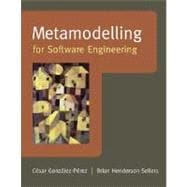
Brian Henderson-Sellers is Director of the Centre for Object Technology Applications and Research and Professor of Information Systems at the University of Technology, Sydney. He is author of over a dozen books on object and agent technologies and is well known for his work in OO methodologies and OO metrics. He is a frequent speaker at conferences, and was voted number 3 in the Who's Who of Object Technology (Handbook of Object Technology, CRC Press). In July 2001, Professor Henderson-Sellers was awarded a Doctor of Science (DSc) from the University of London for his research contributions in object-oriented methodologies.
| Preface | p. vii |
| Software Development Methodologies and Metamodelling | p. 1 |
| What is a Methodology? | p. 2 |
| Metamodelling Needs | p. 11 |
| What is Metamodelling? | p. 17 |
| Summary | p. 18 |
| References | p. 19 |
| Modelling Infrastructure | p. 21 |
| Models and Modelling | p. 21 |
| Modelling Languages | p. 26 |
| Categorization Issues | p. 36 |
| The Relationship Between Models and Metamodels | p. 42 |
| Infrastructure | p. 44 |
| Summary | p. 48 |
| References | p. 48 |
| Using Metamodels | p. 53 |
| Metamodelling for Modelling Languages | p. 53 |
| Metamodelling for Processes | p. 58 |
| Metamodelling for Development Methodologies | p. 62 |
| Metamodelling for Model Transformation | p. 65 |
| Using a Metamodelling Infrastructure | p. 68 |
| Summary | p. 72 |
| References | p. 72 |
| Problems with Traditional Approaches and Current Products | p. 75 |
| Terminology and Culture Clashes | p. 76 |
| Linguistic and Ontological Metamodels | p. 79 |
| Process and Modelling Conflicts | p. 83 |
| The Quality Aspect | p. 95 |
| Solutions and Guidelines | p. 104 |
| Summary | p. 106 |
| References | p. 106 |
| New Approaches to Metamodelling | p. 111 |
| Deep Instantiation-Based Metamodelling | p. 112 |
| Powertype-Based Metamodelling | p. 114 |
| Comparison of Powertype Modelling and Potency | p. 126 |
| Summary | p. 129 |
| References | p. 130 |
| Software Engineering Metamodel for Development Methodologies | p. 133 |
| General Philosophy and Scope | p. 133 |
| High-Level View | p. 141 |
| Process Aspects | p. 144 |
| Modelling Aspects - Product Classes | p. 148 |
| People Aspects - Producer Classes | p. 151 |
| Linking Process and Product Aspects | p. 153 |
| Support Classes | p. 154 |
| Classes in ISO/IEC 24744 | p. 155 |
| Extending the ISO/IEC 24744 Metamodel | p. 157 |
| Summary | p. 161 |
| References | p. 161 |
| Creating and Using a Methodology Generated from the Metamodel | p. 163 |
| Creating a Powertype-Based Methodology from its Metamodel | p. 165 |
| The Endeavour Domain | p. 175 |
| Summary | p. 178 |
| References | p. 179 |
| Proposed Notation for ISO/IEC 24744 | p. 181 |
| Index | p. 203 |
| Table of Contents provided by Ingram. All Rights Reserved. |
The New copy of this book will include any supplemental materials advertised. Please check the title of the book to determine if it should include any access cards, study guides, lab manuals, CDs, etc.
The Used, Rental and eBook copies of this book are not guaranteed to include any supplemental materials. Typically, only the book itself is included. This is true even if the title states it includes any access cards, study guides, lab manuals, CDs, etc.